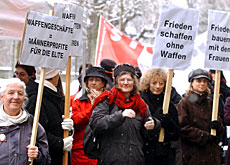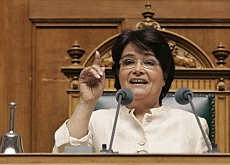Swiss aim for solidarity on women’s day

International politics and migration were the main themes of the events taking place across Switzerland as part of International Women’s Day on Tuesday.
In Bern, 7,000 postcards calling for more action on violence against women were sent to the government from organisations across the country.
The postcards, sent by non-governmental organisations and women’s groups, demanded the proper application of United Nations Resolution 1325 on women, peace and security.
They also called on Bern to stop exporting arms to countries that did not respect women’s rights. A protest was held outside the parliament building.
Inside parliament, Thérèse Meyer, the newly elected speaker of the House of Representatives, gave out roses to female parliamentarians to celebrate the day and to thank them for their commitment. Meyer is only the seventh woman to hold the post.
Foreign Minister Micheline Calmy-Rey also held a seminar on the extent to which women’s issues are a part of Switzerland’s foreign policy.
Solidarity
Meanwhile, the UN Children’s Fund (Unicef) launched a campaign in Switzerland to help stop female genital mutilation. The population was encouraged to wear a special badge as a sign of solidarity.
Some political parties were also involved in women’s day. The Social Democrats presented their equal opportunities council, made up of six women and one man. It is intended to promote equality in the party and in Swiss politics as a whole.
A demonstration in favour of women’s rights took place in Geneva, while around 30 illegal women workers staged a protest at canton Vaud’s equality office in Lausanne. They called on the authorities to grant them official status.
Outside Switzerland, in Sao Paulo, Brazil, 30,000 people were due to mark the start of a women’s march which is expected to cross through 50 countries before ending in Burkina Faso in October.
Other events included a forum which addressed the issues faced by women survivors of the December tsunami in Thailand.
swissinfo and agencies
Women won the right to vote at a federal level in Switzerland in 1971.
Equal rights were enshrined in the Swiss constitution in 1981.
The 1996 law on equality permits official complaints about discrimination.
The idea for an International Women’s Day came from a meeting of Socialist International in 1910 in Copenhagen.
The next year it was marked for the first time in Switzerland, Austria, Denmark and Germany, with rallies calling for the right to vote.
In 1975, the United Nations designated March 8 as International Women’s Day.

In compliance with the JTI standards
More: SWI swissinfo.ch certified by the Journalism Trust Initiative


You can find an overview of ongoing debates with our journalists here. Please join us!
If you want to start a conversation about a topic raised in this article or want to report factual errors, email us at english@swissinfo.ch.